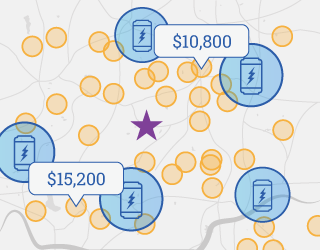NOTE: We’ve written an updated review of some of the current popular home battery products. Check it out here.
Home energy storage is a relatively new technology that’s steadily gained interest over the past few years, and it’s hard to know where to start when comparing all your options. Top solar batteries like those made by Tesla and Sonnen make it possible for homeowners and businesses to store their excess solar energy instead of sending it back to the grid, so that when the power goes out or electricity rates spike they can keep the lights on.
NOTE: Pika Energy was acquired by Generac in 2019, who is now offering their battery technology under the Generac name. Read about Generac’s new product, the PWRcell, in our blog on the product.
What are the top solar battery manufacturers?
If you want to install a solar battery at your home, you have a few different choices currently available to you. Many property owners have heard of the Tesla and their batteries, cars, and solar roof tiles, but there are several high-quality Tesla Powerwall alternatives on the battery market. Read on below to compare the Tesla Powerwall vs. Sonnen eco vs. LG Chem vs. Pika Energy Harbor Smart Battery in terms of capacity, warranty, and price.
Tesla Powerwall: Elon Musk’s solution for home solar batteries
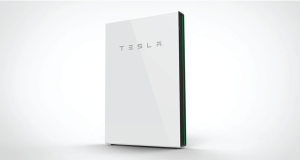
Capacity: 13.5 kilowatt-hours (kWh)
List price (before installation): $6,700
Warranty: 10 years, 70% capacity
The Tesla Powerwall is an energy storage industry leader for a few reasons. First and foremost, the Powerwall is the battery that brought energy storage into the mainstream for many homeowners. Tesla, already well known for its innovative electric cars, announced the first-generation Powerwall in 2015, and overhauled the “Powerwall 2.0” in 2016. The Powerwall is a lithium ion battery with a similar chemistry to the batteries used in Tesla vehicles. It is designed for integration with a solar panel system, but can also be used solely for home backup power.
The second-generation Tesla Powerwall also offers one of the best ratios of cost to capacity of any product available in the United States. One Powerwall can store 13.5 kWh – enough to power essential appliances for a full 24 hours – and comes with an integrated inverter. Before installation, the Powerwall costs $6,700, and required hardware for the battery costs an additional $1,100.
The Powerwall comes with a 10-year warranty that assumes your battery is used for daily charging and draining. As part of their warranty, Tesla offers a minimum guaranteed capacity. They ensure that the Powerwall will sustain at least 70 percent of its capacity over the course of its warranty period.
For more on the Powerwall, read EnergySage’s complete Tesla Powerwall review.
Sonnen eco: Germany’s leading battery producer takes on the U.S.
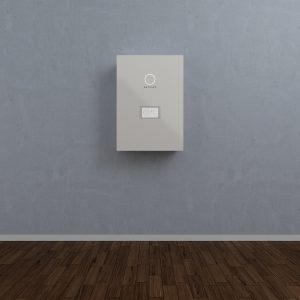
Capacity: starts at 4 kilowatt-hours (kWh)
List price (before installation): $9,950 (for a 4 kWh model)
Warranty: 10 years, 70% capacity
The Sonnen eco is a 4 kWh+ home battery manufactured by sonnenBatterie, an energy storage company based in Germany. The eco has been available in the U.S. since 2017 through the company’s installer network.
The eco is a lithium ferrous phosphate battery that is designed for integration with a solar panel system. It also comes with an integrated inverter. One of the main ways that Sonnen distinguishes the eco from other solar batteries on the market is through its self-learning software, which can help homes with solar panel systems connected to the grid increase their solar self-consumption and manage time-of-use electricity rates.
The eco has a smaller storage capacity than the Tesla Powerwall (4 kWh vs. 13.5 kWh). Like Tesla, Sonnen also offers a minimum guaranteed capacity. They ensure that the eco will maintain at least 70 percent of its storage capacity for its first 10 years.
For more on the eco, read EnergySage’s complete Sonnen eco review.
LG Chem RESU: home energy storage from a leading electronics maker
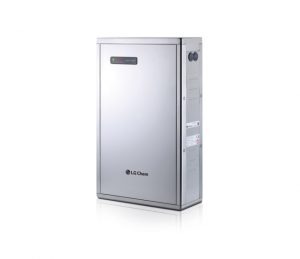
Capacity: 2.9-12.4 kWh
Listed price (before installation): ~$6,000 – $7,000
Warranty: 10 years, 60% capacity
Another major player in the worldwide energy storage market is leading electronics manufacturer LG, based in South Korea. Their RESU battery is one of the more popular options for solar-plus-storage systems in Australia and Europe.
The RESU is a lithium ion battery and comes in various sizes, with usable capacities ranging from 2.9 kWh to 12.4 kWh. The only battery option currently sold in the U.S. is RESU10H, which has a usable capacity of 9.3 kWh. It comes with a 10-year warranty that offers a minimum guaranteed capacity of 60 percent. Because the RESU10H is relatively new to the U.S. market, the equipment cost isn’t yet known, but early indicators suggest that it is priced at between $6,000 and $7,000 (without inverter costs or installation).
For more on the RESU, read EnergySage’s complete LG Chem RESU review.
Pika Energy Harbor Smart Battery: a startup partners with Panasonic for an on/off grid hybrid system
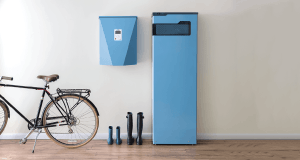
Capacity: 11.4 kWh,17.1 kWh
Listed price (before installation): N/A (installed price ranges from $12,000-$20,000)
Warranty: 10 years
The Harbor Smart Battery comes from Pika Energy, an inverter manufacturer that has recently entered the energy storage space. Unlike some other home batteries, the Harbor Smart Battery is specifically intended to be installed alongside a solar panel system and can be used for both on-site consumption of stored solar energy and grid services like demand response.
The Harbor Smart Battery uses a Panasonic-manufactured lithium ion battery cells and comes paired with a Pika Energy Island inverter, which can be used for both on-grid and off-grid home energy storage. Pika offers two different sizes for the Harbor Smart battery: 11.4 kWh or 17.1 kWh of usable capacity. The Harbor is backed by a 10 year Panasonic warranty.
For more on the Harbor Smart Battery, read EnergySage’s complete Pika Energy battery review.
Aquion Aspen: innovative saltwater battery technology
Update: Aquion went through bankrupcy proceedings in 2017, and has since been acquired and been moved to China for production.
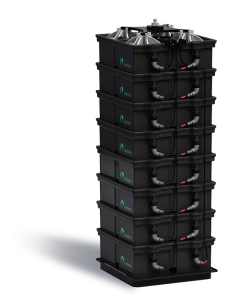
Capacity: 2.2 kWh
List price (before installation): ~$1,000
Warranty: 8 years, 70% capacity
(Note: Aquion filed for Chapter 11 bankruptcy in 2017 and stopped production and marketing of its products. They have since emerged, but may not re-enter the residential market.)
The Aquion Aspen is distinct from other small-scale solar batteries on the market for a few reasons. The first is its size: one Aspen is 2.2 kWh, approximately one-sixth of the capacity of one Powerwall. It comes with a list price to match: a single Aquion battery costs approximately $1,000 (or about one-sixth the cost). These smaller batteries can also be “stacked” – if you want more storage capacity at your home, you can purchase and connect multiple Aquion batteries together to create a larger storage system.
Perhaps the biggest difference, however, is in the Aspen battery’s chemistry. Unlike the Powerwall and eco compact, Aquion’s batteries use saltwater technology. For many homeowners, the most important distinction between battery chemistries is in their environmental impact. Lithium ion batteries must be carefully recycled at the end of their useful life because the chemicals used in their composition can be hazardous if not treated properly. By comparison, Aquion batteries use a saltwater electrolyte chemistry that is environmentally benign. In fact, Aspen batteries are Cradle to Cradle Certified.
Like Sonnen and Tesla, Aquion also offers a minimum guaranteed capacity as part of its warranty – over the course of the 8-year warranty, the Aspen will maintain at least 70 percent of its storage capacity.
Nissan & BMW: major companies entering the industry
Tesla, Sonnen and LG Chem make three of the most popular batteries currently available in the United States, but the market is becoming much more competitive. Nissan and BMW have both announced their intention to enter the fray with their own energy storage technologies in the next few years.
Where to buy solar batteries for your home
If you want to install a home battery pack, you will most likely need to work through a certified installer. Adding energy storage technology to your home is a complicated process that requires electrical expertise, certifications, and knowledge of the best practices required to install a solar-plus-storage system correctly.
A qualified EnergySage-approved company can give you the best recommendation about the energy storage options available to homeowners today. If you are interested in receiving competing installation quotes for solar and energy storage options from local installers near you, simply join the EnergySage Solar Marketplace today and indicate what products you’re interested in when filling out your profile’s preferences section.
